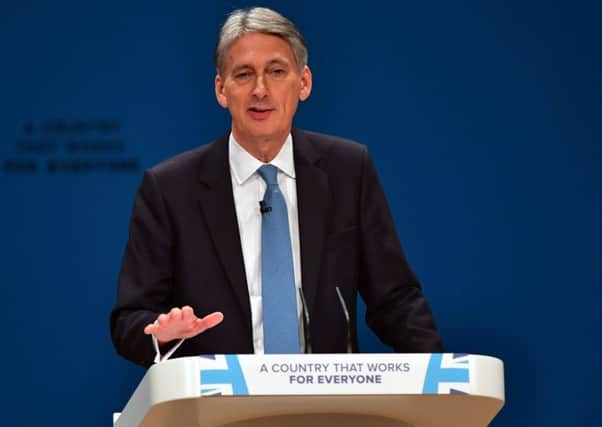Philip Hammond soothes Brexit fears with EU funding promise


Speaking to the Conservative conference in Birmingham, Mr Hammond offered a new guarantee to continue payments of any multi-year EU grants secured by British businesses and organisations before withdrawal – probably in March 2019.
And he announced £220 million of new funding for the tech sector to support efforts to transform biomedical and computer innovations into marketable products.
Advertisement
Hide AdAdvertisement
Hide AdMr Hammond warned that the UK economy faces a “rollercoaster” ride over the coming two years as the UK negotiates a new relationship with its EU partners.
But he said he was ready to take “whatever steps are necessary to protect this economy from turbulence”.
And he hinted that this could include tax cuts to stimulate economic activity, telling delegates that “fiscal policy may also have a role to play” alongside interest rate reductions to boost confidence.
Mr Hammond said that action was needed to boost productivity, invest in infrastructure and tackle the “dangerous” gap between London and the “left behind” regions of the UK, in order to ensure that withdrawal from the European Union is not “the end of an era”, but “the beginning of a new age” for Britain.
His announcement extends for a further two years or more an earlier promise that the Treasury would guarantee funding for EU-backed deals signed by universities and businesses before next month’s Autumn Statement.
The Treasury said that the promise would apply to all structural and investment funds, including agri-environment schemes, so long as they provide “strong” value for money and are in line with domestic strategic priorities.
The pledge is intended to give hundreds of businesses and universities the confidence to continue bidding for competitive EU funds while the UK remains a member.
Mr Hammond said: “I can offer some additional certainty to British businesses and other organisations bidding to receive EU funding while we’re still a member.
Advertisement
Hide AdAdvertisement
Hide Ad“I’ve already guaranteed the funding for projects signed prior to this year’s Autumn Statement.
“Today, I can go further. The Treasury will offer a guarantee to bidders whose projects meet UK priorities and value for money criteria, that if they secure multi-year EU funding before we exit, we will guarantee those payments after Britain has left the EU.”
Mr Hammond’s speech confirmed that he has torn up predecessor George Osborne’s plan to get Britain’s finances into surplus by 2019-20.
But the Chancellor insisted it did not mean an end to spending discipline, saying that public spending would continue to be controlled to keep the UK on the path towards balancing the books.
Mr Hammond said that the Treasury was also “ready to provide support to British businesses as they adjust to life outside the EU” once the two-year process of negotiations under Article 50 of the EU treaties is completed.
Treasury sources declined to say whether this could include the compensation demanded by Nissan for any additional tariffs it is required to pay as a result of Brexit.
But a spokeswoman said that companies such as the Japanese car manufacturer may find the Chancellor’s comment “reassuring”.
Labour shadow chancellor John McDonnell said that, despite his “U-turn” on borrowing, Mr Hammond’s promises fell short of matching the framework for long-term investment in the economy provided by Labour’s Fiscal Credibility Rule.
Advertisement
Hide AdAdvertisement
Hide Ad“The Chancellor should apologise today for the failed Tory approach that has meant he has had to abandon the failed economic agenda of the last six years, an approach which has seen them dragging their heels on tax avoidance, an increase in child poverty, and house-building falling to its lowest peacetime rate since the 1920s,” said Mr McDonnell.